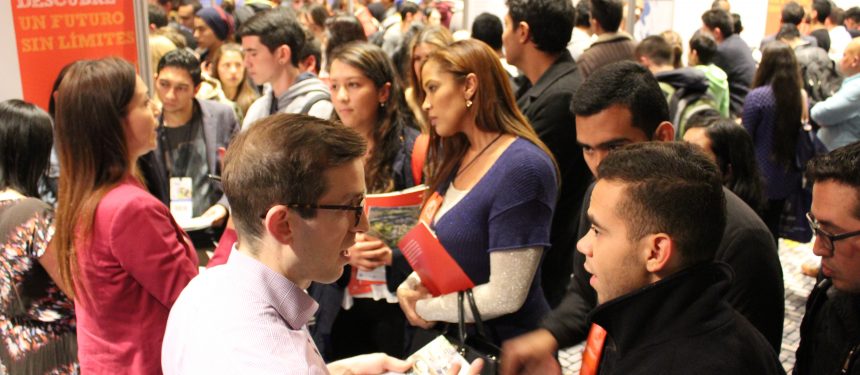The number of US institutions using education agencies to recruit undergraduate and graduate students has more than doubled in the past five years, according to a survey from the American Council on Education.
News and business analysis for Professionals in International Education
Have some pie!
Agent use among US HEIs doubles in five years, survey shows
 Increasing study abroad and recruiting international students were the top two priorities for internationalisation at higher education institutions, the survey found. Photo: FPP EDU Media
Increasing study abroad and recruiting international students were the top two priorities for internationalisation at higher education institutions, the survey found. Photo: FPP EDU Media In 2016, 30% of 1,164 universities said they hire international student recruiters to attract undergraduate students compared to just 11% in 2011. To recruit graduate students, 15% reported using agents up from just 6% five years ago.
Master’s institutions (institutions that award at least 50 master’s degrees and fewer than 20 doctoral degrees) hire agents more than any other type of college or university with just over half (54%) reporting they used agents to recruit international undergraduates.
“I do think that there is increasing attention in the international education field to engaging associate and special focus institutions”
Administered every five years to colleges and universities nationwide and in its fourth iteration, the survey includes all sectors of US higher education and is the only comprehensive study of its kind
The growing use of agents for international student recruitment is fueled by an “acceleration of internationalisation” on many US campuses, the report observes.
Nearly three quarters (72%) of respondents indicated that internationalisation accelerated in recent years, and the proportion of institutions reporting ‘high’ or ‘very high’ levels of internationalisation rose from just over one fifth in 2011 to 30% in 2016.
Increasing study abroad and recruiting international students were the top two priorities for institutions’ internationalisation activities, according to the survey.
Not surprisingly, the percentage of respondents funding travel for their own staff to recruit overseas has nearly doubled at the undergraduate level (44%) and at the graduate level (23%).
The increase in the use of agents comes alongside the ongoing agent debate in the United States, brought to the fore most recently by the Middle States Commission on Higher Education’s proposal to prohibit institutions it accredits from providing incentive-based compensation in international student recruitment.
However, the figures from ACE’s survey suggest a softening of stances among higher education leaders on the issue and correspond to a 2015 survey carried out by the National Association for College Admission Counselling of four-year colleges and universities that found 37% worked with international student recruitment agencies, with an additional 20% actively considering using agencies.
Internationalisation activity varies by institution type, however. Doctoral institutions (universities that award 20 or more doctoral degrees) continue to lead the surge but the findings reveal progress has slowed, with 10% fewer saying they have a strategic plan or task force to carry out internationalisation activities.
Associate and special focus providers, meanwhile, have reported an increase for both indicators with more than 20% saying they have strategic plans and more than 40% having a task force in place.
To understand the divergence among provider types there needs to be more data, said Robin Matross Helms, director of ACE’s Center for Internationalization and Global Engagement and the report’s co-author.
“I do think that there is increasing attention in the international education field to engaging associate and special focus institutions, and addressing some of the unique challenges for institutions in these sectors when it comes to internationalisation,” she told The PIE News.
Data is also lacking on the impact Donald Trump’s presidency may have on institutions’ goals, as the survey was taken from February to December 2016.
The report observes, however, that the executive orders and policy statements related to immigration and foreign relations announced by the administration “will likely impact, perhaps dramatically, student mobility—the aspect of internationalisation delineated clearly by the data as the top priority for US colleges and universities.”
Matross Helms said institutions currently participating in ACE’s Internationalization Laboratory program could provide “a snapshot of campus responses to the political climate”.
They remain very committed to internationalisation activities, she said, adding that they are thinking about what adaptations may be necessary, as well as what potential opportunities could arise.
“We need to be sure that we are also adequately attending to the professional development needs of faculty”
“I think that commitment will persist, and that international education educators will continue to work diligently to keep internationalisation moving forward,” she said.
Another change in the landscape of international higher education marked by the quinquennial survey is a boost in professional development for faculty and staff.
Over half (56%) of respondents said they provide on-campus professional development opportunities related to internationalisation to staff who do not work in the international programs office. Another 34% said they offer similar opportunities abroad.
“I was surprised by the size of the increase in internationalisation-related professional development opportunities for administrative staff, which is particularly exciting given the trend toward internationalisation as an increasingly administrative-intensive endeavour,” said Matross Helms.
“As noted in the report, however, we need to be sure that we are also adequately attending to the professional development needs of faculty.”
Still looking? Find by category:



The lack of use of agents has had a significant negative impact on numbers of students studying in USA from India.
The real increase in institution and agency relationships increased post the NACAC clarification on it’s policy on agents.
More and more institutions are now gathering the courage to work with agents.
This can only result in higher success in recruiting International students as this data has shown and similar data has shown all over the world.